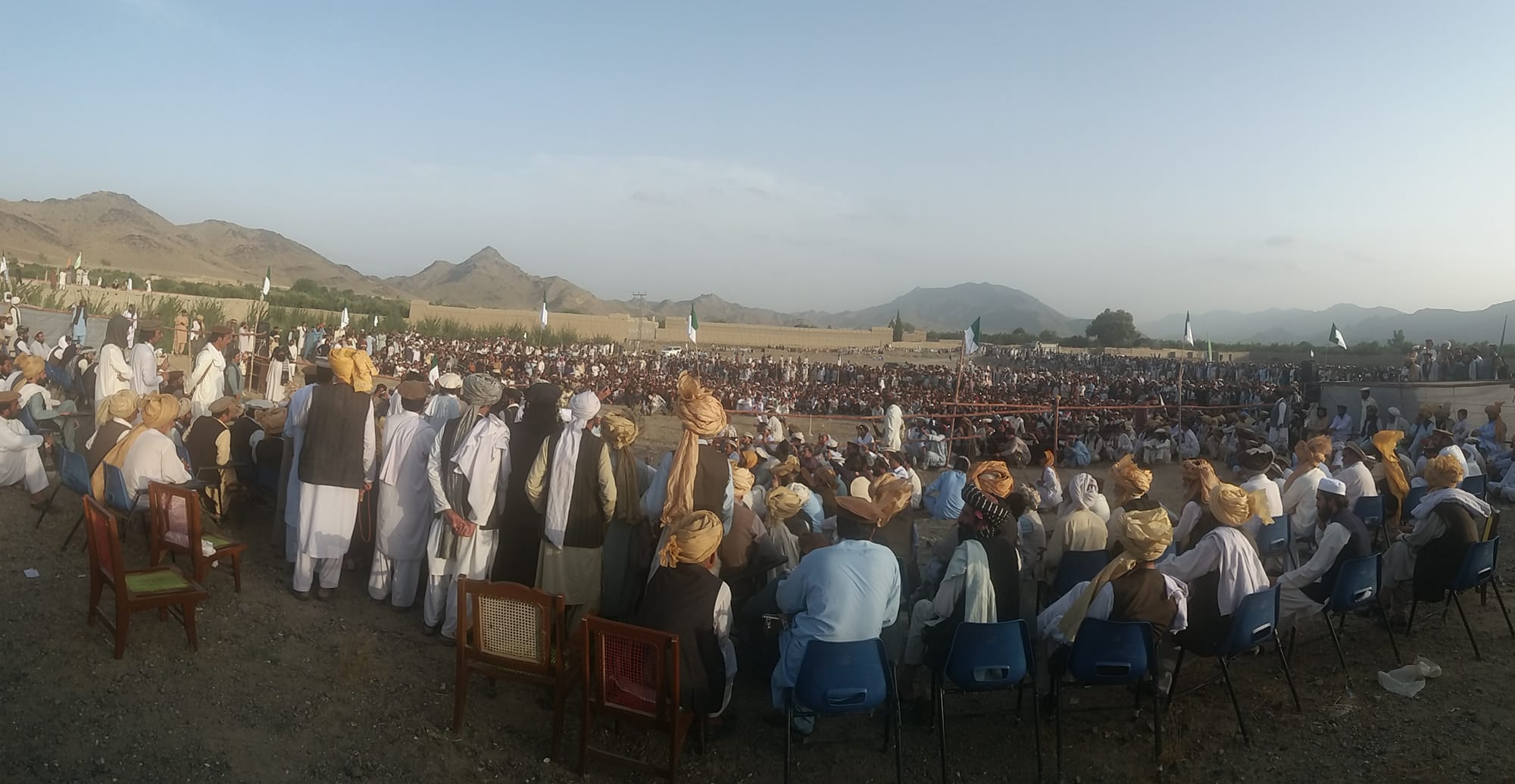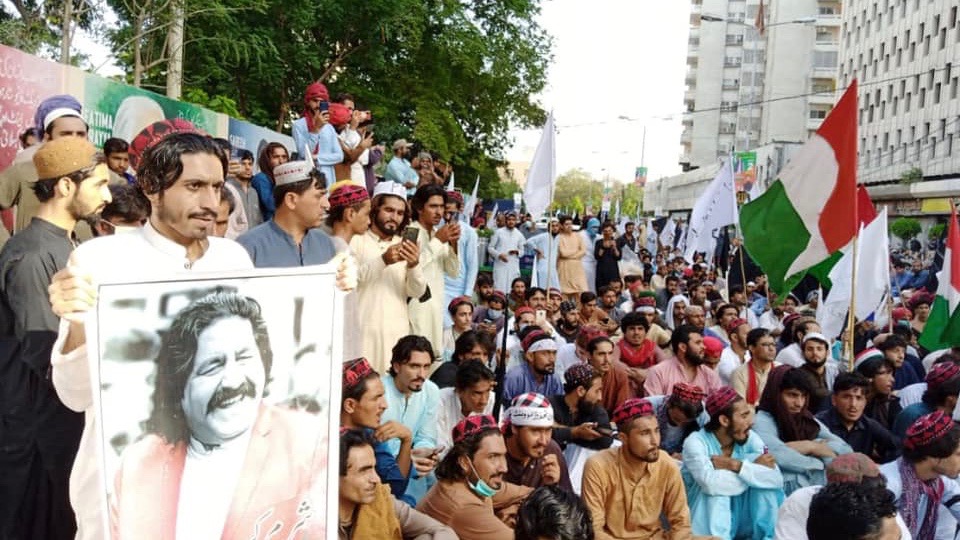Although he was granted bail by an anti-terrorism court in Karachi on September 13 in the fourth and final case against him, Ali Wazir, legislator and Pashtun rights activist from Waziristan, is yet to be released. He has been behind bars for nearly two years on several charges, including those of hate speech and sedition.
Wazir, who is diabetic, has faced considerable health problems while imprisoned. He was reportedly hospitalized on September 10.
Wazir has been consistently targeted for his unequivocal criticism of the Pakistani army and the human rights abuses that the Pashtun ethnic minority face in Waziristan and neighboring border areas in the former Federally Administered Tribal Area (FATA), now a part of Khyber Pakhtunkhwa.
Who is Ali Wazir?
An activist and Member of the National Assembly (MNA), Ali Wazir is a resident of Wana in South Waziristan, close to the Afghan-Pakistan border. The region has been considered a safe haven for terrorist activities of Al-Qaeda and Taliban groups since the early 2000s. Wazir was first imprisoned while he was still a student in 2005, under the colonial-era Frontier Crimes Regulation (FCR) law.
While he was in prison, his father, his brothers, and an uncle were killed in an ambush. On May 1, 2020, his cousin – and fellow leader of the Pashtun Tahaffuz Movement (PTM) – Arif Wazir was shot down by unidentified gunmen. In two decades, Ali Wazir has lost 18 family members to political violence in the region.
Writing in the Asian Marxist Review in 2018, Wazir records his ordeal: “I had committed no crime, never got a fair trial, and was not sentenced, yet I was prevented from participating in the funerals for my family. In the subsequent years, six more members of our extended family were assassinated. […] We faced economic ruin after all of the notable men in our family were eliminated. The government failed to prevent the militants from demolishing our gas stations. […] Our apple and peach orchards in Wana were sprayed with poisonous chemicals, and our tube wells were filled with dirt to force us to surrender to the forces of darkness.”
Wazir first ran as an independent candidate from South Waziristan in the 2013 general elections. He lost the elections by 300 votes, and he suggests that this was because “the Taliban intimidated voters and tortured [his] supporters.” He was later elected as an MNA, a member of the lower house of the parliament of Pakistan, in the next general election, in 2018. He is the only Marxist to be part of the National Assembly of Pakistan.
Wazir is also one of the leaders of the PTM, a popular, non-violent, mass movement that shot to prominence in 2018 after the extrajudicial killing of Naqeebullah Mehsud in Karachi. The PTM represents the accumulated grievances of Pakistani Pashtuns over the last four and a half decades of imperial and civil warfare in the former FATA region.
Its main demands are the recovery of more than a thousand ‘missing’ or ‘disappeared’ persons from the region and an end to the humiliating ethnic profiling of Pashtuns across the country. Pashtuns are often considered “Taliban sympathizers” by the security state, and persecuted for this reason. The PTM has demanded justice and accountability for the economic devastation brought into the lives of Pashtun families, thousands of whom have been internally displaced by the state’s military actions.
Plight of Pashtuns caught between militants and the military
The former FATA in northwest Pakistan has shared a porous border with Afghanistan ever since the establishment of Pakistan as an independent country in 1947. After the US ‘war on terror’ began in 2001, Taliban-allied groups began seeking refuge in the region, leading to a crackdown by the Pakistani military. The people of the region have been caught between these two forces for the last two decades.
In 2014, Pakistan launched a military offensive called Operation Zarb-e-Azab against militant outfits like the Tehreek-i-Taliban Pakistan (TTP), the Pakistani wing of the Taliban. The clash between the TTP and the military has resulted in unprecedented violence toward locally-residing Pashtuns, who are frequently accused, persecuted, and killed for allegedly aiding and abetting terrorist groups, under the collective and territorial responsibility clause of the FCR. The FCR allows collective punishment against a culprit’s tribe and permits authorities to hold individuals for up to three years without charge.
While the government and military have at times worked with the militants, and at other times shown them degrees of leniency, they have not extended the same to others like the PTM who have been campaigning against military excesses and violence in the region.
Why has Ali Wazir been targeted?
Wazir has been consistently targeted by both state and non-state forces for his vocal criticism of the Pakistan’s army’s involvement in the former FATA region. In an interview published by Jamhoor in 2020, Ismat Shahjahan, deputy general-secretary of the socialist Awami Workers’ Party (AWP) and president of the Women’s Democratic Front (WDF), said that “the Pakistani establishment has also tried to delegitimize the Pashtun nationalist movement by conflating it with ‘terrorism.’”
She added: “the PTM has directly challenged the national security state. We point out that our constitution has no room for a national security state, for contracts to paramilitary forces, death squads, and military enterprises. Because we have challenged the constitutional legitimacy of the national security state in this way, we have faced this level of repression.”

1km away from here,Taliban centeral office and Taliban colony is located. During 1st Afghan war, after Saur revolution, this office was used as main training center for taliban. Still taliban are getting training here.
~8000 participated in this Gathering.
In recent years, Wazir has also faced continuous attacks on his life. According to Project Polis, in June 2018, when he was campaigning for the election, he escaped an attack that wounded 25 of his supporters. Another attack took place in Kharqamar, North Waziristan, on May 26, 2019, claiming the lives of 17 party workers. As Wazir was making his way to a protest staged by a local tribe, he, fellow Waziristan MNA Mohsin Dawar, and hundreds of PTM political supporters were shot at by the army as they crossed a check-point. Wazir was not wounded in the attack, but both he and Dawar were immediately arrested on charges of instigating the so-called “clashes” between soldiers and PTM supporters.
Wazir was reportedly attacked twice in June 2022 while hospitalized at the Jinnah Postgraduate Medical Centre in Karachi, where he had been taken from Karachi Central Jail. Taking cognizance of the reported attack, the National Human Rights Commission (NHRC) of Pakistan released a statement on the treatment being meted out to the legislator: “Despite issuance of Ali Wazir’s production orders, he has not been taken to Islamabad… to Islamabad to fulfil his Constitutional obligations as member of parliament.”
What are the cases against Ali Wazir?
The cases filed against Ali Wazir stem from a speech he gave on December 6 in Sohrab Goth town, a suburb of Karachi. Naya Daur quotes Wazir’s lawyer Qadir Khan as having said that Wazir’s speech, originally delivered in Pashto, was translated into Urdu by a police constable, and therefore was taken out of context. “The translated version reflected that the prosecution based the case on preconceived notions and stereotypes about the Pashtun community,” Khan had said.
He was arrested along with several other Pashtun rights activists, including Manzoor Pashteen, one of the founding members and the de facto face of the PTM.
Dawn reports that Wazir has been accused under sections 120-B (punishment for criminal conspiracy), 121 (waging or attempting to wage war or abetting the waging of war against Pakistan), 121-A (conspiracy to commit offences punishable under section 121), 124-A (sedition), 153 (wanton provocation with the intent to cause riot), 153-A (promoting enmity between different groups), 505 (statements conducive to public mischief), 506 (punishment for criminal intimidation), and 188 (disobedience to an order duly promulgated by a public servant) of the Pakistan Penal Code, and section 7 of the Anti-Terrorism Act, 1997.
After he was arrested from Peshawar on December 16, 2020, he was flown to Karachi. His trial began in January 2021.
Wazir was granted bail by the Supreme Court of Pakistan on 30 November, 2021, and later the Sindh High Court granted him bail in another case in May 2022. However, he continued to be incarcerated as a third case was lodged against him and other PTM members by the Karachi police for alleged hate speech against state institutions. Wazir was granted bail in the third case in July 2022.
Even after the court in Karachi announced the bail order in the fourth and final case of sedition against Wazir, he can only be released after producing the surety amount of PKR 1.9 billion.





